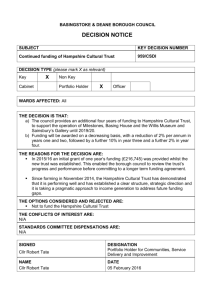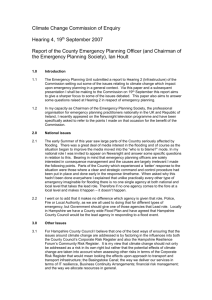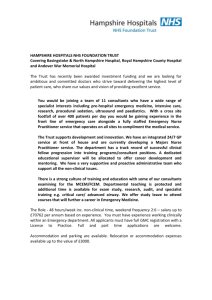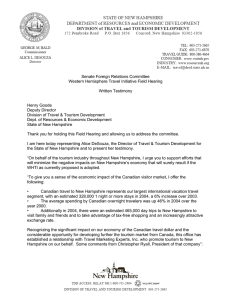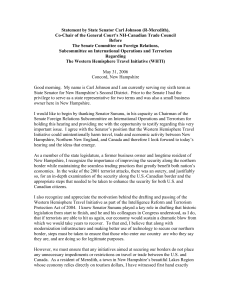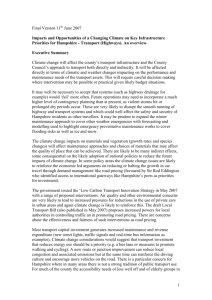education, health, welfare, nutrition, access to job opportunities, etc
advertisement
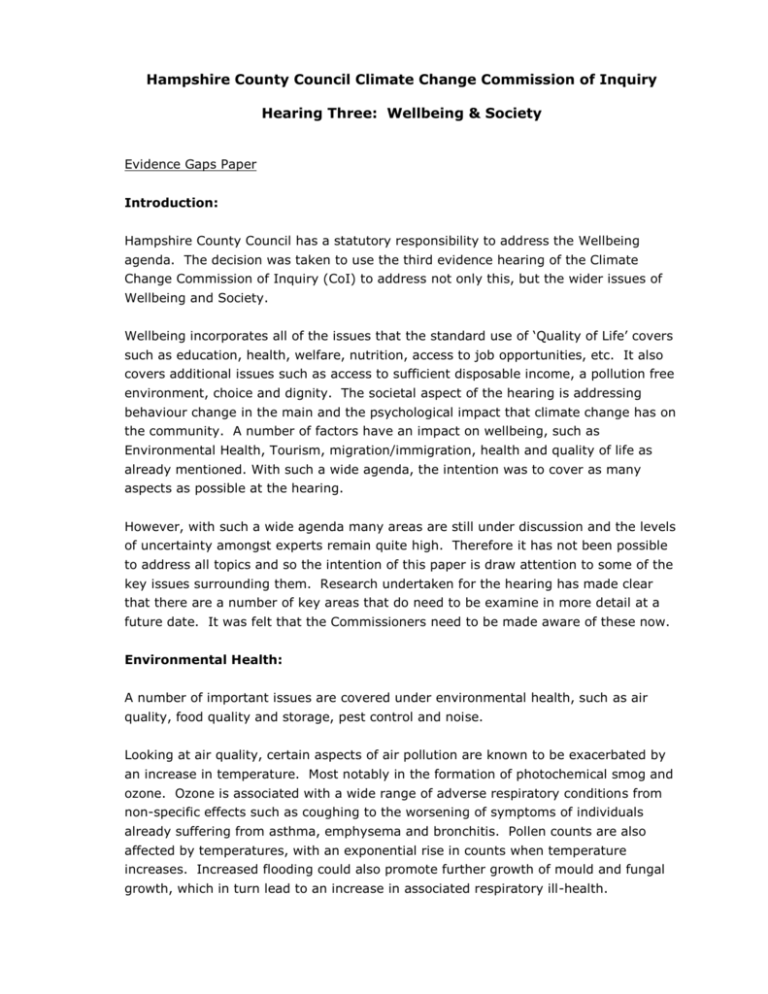
Hampshire County Council Climate Change Commission of Inquiry Hearing Three: Wellbeing & Society Evidence Gaps Paper Introduction: Hampshire County Council has a statutory responsibility to address the Wellbeing agenda. The decision was taken to use the third evidence hearing of the Climate Change Commission of Inquiry (CoI) to address not only this, but the wider issues of Wellbeing and Society. Wellbeing incorporates all of the issues that the standard use of ‘Quality of Life’ covers such as education, health, welfare, nutrition, access to job opportunities, etc. It also covers additional issues such as access to sufficient disposable income, a pollution free environment, choice and dignity. The societal aspect of the hearing is addressing behaviour change in the main and the psychological impact that climate change has on the community. A number of factors have an impact on wellbeing, such as Environmental Health, Tourism, migration/immigration, health and quality of life as already mentioned. With such a wide agenda, the intention was to cover as many aspects as possible at the hearing. However, with such a wide agenda many areas are still under discussion and the levels of uncertainty amongst experts remain quite high. Therefore it has not been possible to address all topics and so the intention of this paper is draw attention to some of the key issues surrounding them. Research undertaken for the hearing has made clear that there are a number of key areas that do need to be examine in more detail at a future date. It was felt that the Commissioners need to be made aware of these now. Environmental Health: A number of important issues are covered under environmental health, such as air quality, food quality and storage, pest control and noise. Looking at air quality, certain aspects of air pollution are known to be exacerbated by an increase in temperature. Most notably in the formation of photochemical smog and ozone. Ozone is associated with a wide range of adverse respiratory conditions from non-specific effects such as coughing to the worsening of symptoms of individuals already suffering from asthma, emphysema and bronchitis. Pollen counts are also affected by temperatures, with an exponential rise in counts when temperature increases. Increased flooding could also promote further growth of mould and fungal growth, which in turn lead to an increase in associated respiratory ill-health. It should be noted however, that any major changes in policy governing air quality are largely made through national policy measures. It will be influencing these policies where Hampshire has an important role to play. Food quality and storage; at higher temperatures, food degrades much more swiftly with a potential increase in the development of bacterium causing illnesses such as food poisoning. This also leads to more being thrown away, action may be required, such as altering waste collections to prevent pests such as rats and flies from proliferating, bringing with them increased risk of disease to communities. With the increased chances of flash flooding, water-borne pests and diseases could also increase with the overflow of storm and waste water during high rainfall events, where flood water takes time to subside. Noise: As weather patterns shift so will peoples behavioural attitudes and lifestyle responses. Lifestyles are already moving to a more 24/7 outlook, this could be promoted by climate changes, particularly with hotter drier weather, with people choosing to be more active early and later in the day avoiding the heat of the midday. In close built communities this could lead to increased levels of noise, and consequential responses, e.g. anti-social behaviour. Demographics and Population: The movement of local populations has a major impact on communities. As the weather patterns change and as sea levels continue to rise, large parts of the world will become inhabitable and those communities directly affected will be forced to move to survive – becoming what is more commonly called climate change refugees. According to the fourth assessment report from the Intergovernmental Panel on Climate Change (IPCC), estimates on the number of climate change refugees sit as high as 50 million people. While contentious and not currently an issue for Hampshire, it could becomes so in the future. Therefore planning for these ‘mass migrations’ needs to take place now. The associated impacts on services and infrastructure will be difficult to respond to if left until some unknown future date. It is also clear that enabling our own workforce to fill current gaps in the workplace will be a more positive step forward, instead of using migrants to fill roles and thereby ‘encourage’ unemployment in the County. Security: While the paper submitted by Chief Inspector Kory Thorne addresses the possible issues for the County arising from climate change and its impact on local communities, there are other issues that need to be addressed. Climate change will overstretch many communities adaptive abilities over the coming decades, at it’s extremes this could result in possible destabilisation and violence. However, it could also serve as an opportunity to unite communities, providing that the real threats climate change presents is recognised early and tools to respond adequately and correctly are available. Climate policy could therefore become part of a preventative security policy. Tourism: The tourism and leisure industries appear to offer opportunities in terms of climate change impacts in Hampshire. By the 2050s the County will experience hotter, drier summers and will quite likely have a climate close to current day Bordeaux in France. This will not necessarily stop people travelling overseas for their holidays, but might influence the timings and number of holidays that they take. For example, it is likely that as the Mediterranean becomes hotter, people will tend to go on holiday there earlier or later in the year and possibly have a second holiday in the UK – with the South Coast an attractive option as a destination. Currently the Hampshire coastline offers a variety of attractions for both locals and tourists alike. Warmer summers will extend the length of time and variety that these can be offered for; thereby increasing income generation, but may also bring about changes to work practices and employment in this sector. However, there is also a degree of risk to the leisure and tourism industries and adaptation measures to the changes that are already in the climate system will need to built in now. While there will be a bigger market for places to stay, eat and drink, linked with this there will be more pressure on the infrastructure in terms of roads and congestion and increased demand on services such as water – both in consumption and waste. There will be less water available at peak times in our rivers and in winter, flash flooding could cause serious damage to surrounding infrastructure. Linked with this are potential sewage and health issues which are discussed under Environmental Health. There is also the likelihood of changes in appearance and make-up of some landscapes and species change and move. More open spaces with shade will be needed for the predicted hotter drier summers. Conclusion: Many of these issues are very important and will have a direct impact in Hampshire; however, in the absence of any expert information and research, we do not know what the priorities for action are. Are there some that need to planned and started now or some that while important and urgent need to be started later? More research and discussion is needed over the coming months to clarify these points. Background Information: 1. Air Quality and Climate Change: A UK Perspective published by the Department for Environment, Food and Rural Affairs, produced by the Air Quality Experts Group 2. Climate Change and Tourism in the South of England 3. Environmental Health Implications of global climate change 4. Taking the Temperature: Towards an NHS response to global warming published by the NHS Confederation 5. World in Transition: Climate Change as a Security Risk (Summary for Policy Makers) published by the German Advisory Council on Global Change
